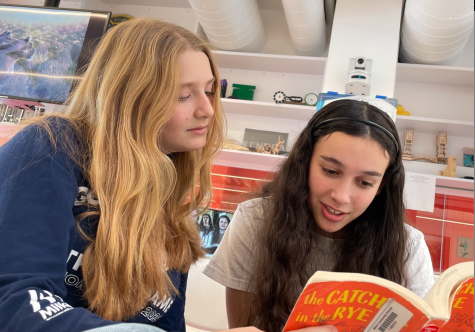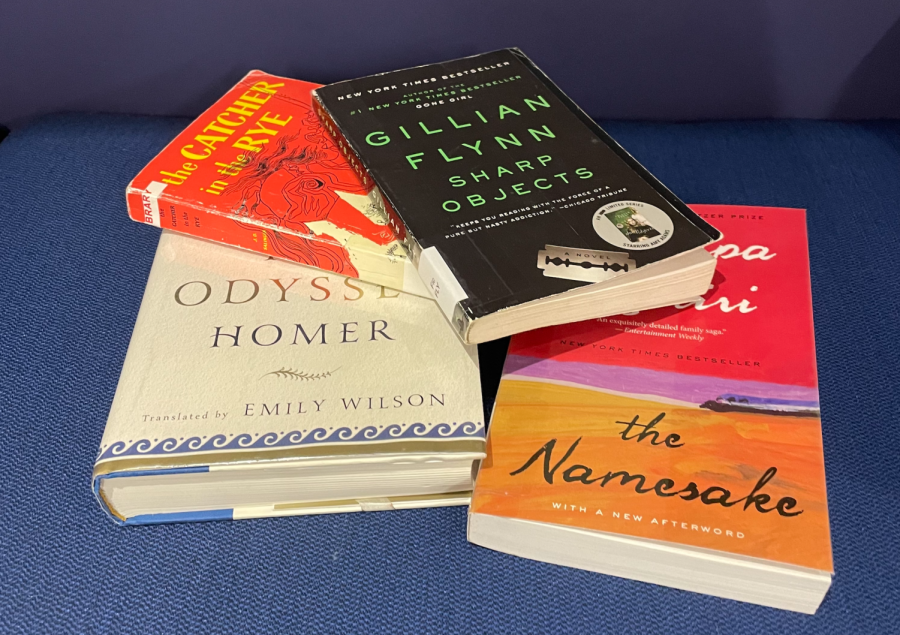Trigger Warnings: Do Milken Summer Reading Books Need Any?
Books, required and optional, which were in this year’s summer reading list and are known to require trigger warnings.
In the summer of 2021, Ari Hoffman ‘23 was reading The Power by Naomi Alderman, during her free time at camp, when she came across a scene in which the perspective changed to a photographer, in the middle of a militant battle. The photographer was taking pictures of the scenes of “gore and guts and all of that was so viscerally described…and masses upon masses of sexual assault.” Ari was uncomfortable but she kept reading because this was her assigned summer reading. Granted, she had chosen it from a list of possible selections for rising 11th graders, but the list didn’t mention that assault, drugs, suicide, sexual assault, gore, and explicit death would be part of the story. If it had, she still would have read the book, but she would have been prepared. She did not feel comfortable and yet she “had to see the book through in order to just do my summer reading.” The lack of warning ruined the way she thought of The Power and prevented her from having a deeper understanding of the book because she could only focus on the shocking parts.
At the end of the school year when people look over the summer reading list, they click the provided Amazon link, read the description, and choose the book which looks most interesting to them. However, part way through the book, some students realize that the book they chose includes topics that are triggering for them. They do not know to look for trigger warnings before choosing their book and the Amazon link does not provide one.
According to University of Waterloo, Center for Teaching Excellence, a trigger warning is “a statement made prior to sharing potentially disturbing content. That content might include graphic references to topics such as sexual abuse, self-harm, violence, eating disorders, and so on.” The purpose of a trigger warning is “to allow students to prepare emotionally for the content or to decide to forgo interacting with the content.” If the link Milken supplies does not give a warning to the students and the letter does not tell them to search for them then should there be resources to find trigger warnings with the reading list? And is this something that is necessary for other spaces at Milken to protect the mental and emotional health of the students?
According to Dr. Kimberly Schwartz, Milken’s Chief Curriculum & Program Officer, and Mr. Gabe Bitto, an Upper School English teacher, each year the English Department faculty get together and review the summer reading list. They review the previous lists and whether there are changes in the school year reading as they want most of the books to relate to the grade level curriculum. They consider the diversity and representation in the text style, authors, characters, and settings to decide whether or not a book should be added or removed. As experts in their field and avid readers, they engage in discussion about the text and if there are books that should be changed out or added. They also use different external sources, such as Common Sense Media and School Library Journal, which specialize in working with schools to show the issues in various types of media through their ratings and recommendations. They want students to read two books from this list over the summer based on research that students lose reading proficiency during the summer. Therefore, there are currently 5-10 options per grade. Every book on the list has been read by at least one person in the department. As of this year, the pattern varies for AP Literature and High Honors Jewish Thought — one particular book required for each of those courses — The Namesake by Jhumpa Lahiri for AP, which has many known trigger warnings such as Graphic Death and As a Driven Leaf by Milton Steinberg for Jewish Thought, which has no known trigger warnings.
The 2022 summer reading list was an experiment in order to receive feedback on which books were appropriate and engaging before implementing changes. It came to the attention of Ms. Leora Smith, Milken’s English Department Head, that there is sensitive content in some of these books that need to be looked at with a finer eye. While the department has not factored in the counseling team in the process of going over the summer reading books, Ms. Smith is in favor of having that holistic lens by including them in the process. She also encourages feedback from students and parents because Ms. Smith is very open to reimagining the list. Especially because a book that may have worked for one specific group of students at a certain point in time may not work for this group of students.

Ashley Ben-Cohen ‘26 read The Catcher in the Rye by J.D. Salinger and she believes that there should be a trigger warning because “we don’t know what people are battling… It talks about really heavy deep topics.” She thought there should be trigger warnings for death, drug use and prostitution. Reid Chariton ‘26 felt that a warning on prostitution was necessary because of the scene in which Holden, the main character, is offered to pay for a prostitute by a landlord and decides to invite the prostitute in. The prostitute, Sunny, is described to be around Holden’s age of 16. When Holden decides to just talk to Sunny rather than have sex she tells him he has to pay her 10 dollars anyways. When he refuses and only pays five, Sunny has the landlord come and beat him up. Samara Stern ‘25 believes that this scene also requires a trigger warning for violence.
Nicholas “Nick” Nehorayan ‘23 does not believe there needs to be trigger warnings at Milken because the school is not showing students anything illegal or inappropriate. “I think Milken’s goal is to give you an education… [that] should undoubtedly be equal to the curriculum that we are supposed to get.” He believes that this curriculum needs to be completed because “I think everyone needs to be exposed to everything” and “the benefits to that are …[necessary] moving forward in life, college, working, maybe graduate school.” Due to this Nehorayan believes “there should be no excuse to walk out of the classroom because a subject is triggering you because you need that exposure.”
Mr. Max Greenberg, 11-12 Division Counselor, believes that there is a benefit to supplying high school students with trigger warnings or, as he prefers to refer to it, “emotional content preview” when possible because it’s helpful to students who had a challenging or traumatic experience that the content could re-trigger. Furthermore, it is helpful to provide students with anxiety with the knowledge of what to expect in order to prevent unnecessary anxiety.
When asked whether she believes trigger warnings should be provided for summer reading, Ms. Velear Schrupp, the Director of Library and Ed Tech Services said, “I think that it’s helpful, especially if the description does not allude to that [triggering topic] because we don’t know what the lived experience of people are. I would hope that’s not someone’s experience but that’s not for me to decide, so I think I lean towards providing the information so people can make informed choices.”
Mr. Bitto believes that having trigger warnings is a good practice, however, he brings up that it would be challenging as a department to come up with a standard for trigger warnings as they would look different for each person. However, the way these triggering topics are handled is important as well. The factors of what, where, and how make establishing standards around trigger warnings complicated. Ms. Smith believes that the major challenge with the English Department providing trigger warnings would be that there is such a range of topics that could be triggering that the department may miss some and may emphasize others. However, if the department receives feedback that a specific book is harming students they will do their best to “mitigate for that and take a deeper look if that book should be on the list.”
Mr. Bitto worries that framing books with “beware” could push students away when the point is to invite students in. However, he also mentioned that it’s “hard because it is also something that students are asking for, demanding”. However, out of the seven students interviewed, five said there should be trigger warnings for the summer reading books and they would have read it even after seeing a trigger warning. One said he believes that trigger warnings are not necessary, he mentioned that this is because he has never had an experience that makes reading about topics such as rape and drug use, which were in his chosen book, harmful.
Mr. Greenberg, Dr. Schwartz, Ms. Smith and Ms. Audrey Morchy, the 9-10 Division Counselor, were asked whether a resource tile could be created on MyMilken which would have links to reliable sources for content notices and trigger warnings. They all believe that it would be achievable; however, Ms. Smith is unsure if this is a format that students will use. She believes if students want that support, it would be safer to go with a personal approach. Ms. Smith emphasizes that she, along with the rest of the leadership team, are available all summer long for students and parents. Mr. Greenberg, Ms. Morchy, Dr. Schwartz, and Ms. Smith support the idea of mentioning that students or parents may want to check what content is in the book in order to personally ensure it is not traumatizing, as well as providing a recommended source for checking content in the letter sent out with the summer reading list choices.
Dr. Schwartz believes people should know about sensitive content to be able to make an informed decision however she is still trying to find the balance between “how much the school and the educators take responsibility for providing that information versus how much the educators help the students and the parents to do that investigation on their own” because this is very individual for each person.
Ms. Smith “wants to empower students to choose texts that are going to be engaging for them and will be at a reading level that is appropriate as well as contain content and themes that will be an accessible read. That said, we encourage students to do…a little bit of research on the books they will be choosing.” She encourages students to look at reviews online and websites like Common Sense Media. Furthermore, she encourages any student who would like assistance in choosing a book to go to any English teacher.
Additionally, students should be able to approach teachers on whether the upcoming required content needs preparation through conversation or finding a different strategy to avoid harm with teachers, parents,or counselors. Dr. Schwartz also mentioned that the administration is trying to have more upfront communication about the content covered in required reading “which has led to the start of a conversation about what does that look like potentially for choice based reading” and if this is for summer reading, other choice reading or recommendation lists during the school year.
Dr. Schwartz recommends as a good source that even goes beyond trigger warnings is Common Sense Media which was also supported by Ms. Morchy, Ms. Smith, and Mr. Greenberg. However, it is important to acknowledge that Common Sense Media does not have everything. Reading the book’s description will sometimes give a general gist of the book and occasionally there will be an option to read a page of text to get the language and tone of the book. She does not recommend using online reviews since she believes they are usually not reliable because they are specific to a personal experience.
While being asked about whether she believes that the chosen summer reading books specifically require a warning, Ms. Morchy said that it is important to have trigger warnings for summer reading books you get to choose and especially for the required summer reading books. She says this is because people need a heads up to prepare themselves emotionally for reading the book and for further conversations that will come up in school during discussions of the book which usually happen with the required book. Ms. Morchy said that “Just because you read the book, you got through it, now you’re going to have to go to school to talk about it. That’s going to be in itself a very difficult challenging event.” If a person went through a traumatizing event and were able to psychologically deal with reading about it they then have to go into a classroom to discuss that topic without knowing what that conversation will look like. Therefore, students should prepare themselves for the upcoming conversation. A way for a student to prepare themselves could be through conversations with a therapist, counselor, teacher, parent, or other trusted adult. These trigger warnings are there for everyone but especially to prevent students who went through trauma from relapsing or struggling to function.
These warnings also are important in the classroom. If a teacher is going to present a book with a topic such as kidnapping, it is important to provide that preview and have a discussion with the class saying if anyone feels uncomfortable please see me privately. The more open the faculty is to engage in these discussions, the easier it will be for students to engage with the curriculum. Furthermore, if it is a major trigger for the student it would be beneficial to make the effort to get support to work through that while getting the academic information, whether that be through meeting with a counselor in school or having additional counseling and therapists from outside of school.
When asked about implementing trigger warnings into classroom discussions, Ms. Smith brought up the example of her eighth-grade class which is reading a book with a scene of sexual assault. She planned for it to be an in-class reading, and gave students a chance to leave class, and even to completely opt-out. Some students did and not only were they not penalized, but rather, praised for taking care of themselves emotionally. When books are chosen with sensitive content, the book itself has to have its own literary merit. In middle school, it is traditional that when a book is being started, an official note is sent out with the book’s learning outcomes and merit. As well as a discussion in class with preparing activities to get students ready. Now that Ms. Smith is the instructional leader, she plans to implement this process in the high school as well.

Noa Karidi is a senior in her second year as a member of The Roar. She is both the managing editor of The Roar as well as the manager of the morning announcements...




Spencer Davis • Nov 2, 2022 at 11:25 pm
Really interesting perspectives here. Personally, I feel like trigger warnings take away from a book because they spoil some of its content. But I’m privileged enough to not need them. For the wellbeing of all students, I think Milken should provide an external link on the summer reading list to a list of trigger warnings, or the link to Common Sense Media (though you noted it’s often incomplete in terms of trigger warnings). But I also agree with Nick in some senses. I think that it’s the school’s responsibility to prepare us for college, and college reading lists are often extremely explicit and triggering. Maybe the English teachers should encourage that we do research into a book’s themes and trigger warnings for books in high school to prepare us for that work later…